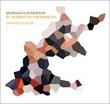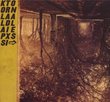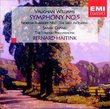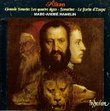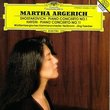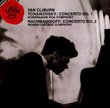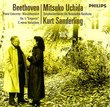| All Artists: Peteris Vasks, John Storgårds, Juha Kangas, Tampere Philharmonic Orchestra, Ostrobothnian Chamber Orchestra Title: Peteris Vasks: Symphony No. 2; Violin Concerto "Distant Light" Members Wishing: 1 Total Copies: 0 Label: Ondine Original Release Date: 1/1/2003 Re-Release Date: 4/22/2003 Genre: Classical Styles: Forms & Genres, Concertos, Symphonies Number of Discs: 1 SwapaCD Credits: 1 UPCs: 761195100523, 761195100523 |
Search - Peteris Vasks, John Storgårds, Juha Kangas :: Peteris Vasks: Symphony No. 2; Violin Concerto "Distant Light"
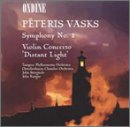 | Peteris Vasks, John Storgårds, Juha Kangas Peteris Vasks: Symphony No. 2; Violin Concerto "Distant Light" Genre: Classical
This is the world premiere recording of Vasks' second symphony. It is a 40-minute, one-movement work which opens with a glorious bang, with the orchestra at its most powerful and busy. A few minutes in, Vasks offers us rep... more » |
Larger Image |
CD DetailsSynopsis
Amazon.com This is the world premiere recording of Vasks' second symphony. It is a 40-minute, one-movement work which opens with a glorious bang, with the orchestra at its most powerful and busy. A few minutes in, Vasks offers us repose which is almost religious, there is a buildup and then more reflection, and a long crescendo to great might again. The work ends on a beautifully introspective, soft, haunting refrain. Vasks is primarily a Romantic, so the work is tonal; there are touches of Kancheli (but not as much breast-beating), Shostakovich (again, not as pessimistic). It's a beautiful, very satisfying work, and the scoring is fascinating in its use of bells, xylophone, and many woodwinds. The violin concerto is somewhat more thorny in its harmonic approachability, but it also has a faraway aura and texture to it at times which is both melancholy and mellow. Its cadenzas are real virtuoso moments, and John Storgårds plays it all beautifully (Juha Kangas conducts this work). The performances of both orchestras are sublime and the sound is big, clean and vibrant. The combination of familiarity and daring here is most worthwhile. --Robert Levine Similarly Requested CDs
|
CD ReviewsVasks' voice distinctive, profound, if hardly original. David A. Hollingsworth | Washington, DC USA | 05/29/2003 (5 out of 5 stars) "Whatever Vasks' works, on this disc at least, may lack in ultimate originality, they sure make up with the profundity in their expressions and articulation. The Second Symphony, a symphonic canvas of various moods, was completed just four years ago, in 1999. Peteris Vasks is quite a renowned composer in his own right, and who enjoys, after Janis Ivanovs during the last century, the status as Latvia's foremost composer, very much like Giya Kancheli of Georgia, Valentin Silvestrov of the Ukriane, and Arvo Part of Estonia. He composed the piece due to a joint commission by the BBC & the Bournemouth Symphony Orchestra (which premiered it during the 1999 Proms with Yakov Kreizberg conducting).And Giya Kancheli props up at various points in these two works. The Second Symphony, for example, begins forcefully, yet with an underlying purpose (to essentially reflect those who suffered during the Twentieth Century). While the explosiveness of the beginning evokes Kancheli and even Shostakovich, the mood relaxes thereafter into something hymn-like in spirit yet reflectively so. The introspection is sort of a religious orthodoxy in characterization, and at 2'16", one can envision church gatherers singing a hymn remembering the beloved. This secondary idea, pensive yet spiritually absorbing, conveys something searching, that sense of longing, as though nostalgia becomes the feeling of the present (look at Allan Pettersson's music for instance, whose world is quite evoked also in the score). Kancheli's music again props up in this, and the ensuing passages show sharp contrast between the highly charged energy with menacing power and scope and the inner world of subtle introspection. Even contemporary composers like Vasks, Kancheli, Part, and even Silvestrov and Tan Dun are effective in reminding us that nostalgia is not a dirty work, but instead an healthy feeling of that sense of history that older generations tend to cling on to as daily lessons while the younger generations, at times, can take it too much for granted. The scherzo-like passage, at say 21'15", can be nostalgic in mood. Only this time, however, the mood has this Sibelian playfulness about it (and Stravinsky's ballet "Petroushka" comes to mind in its naiveté). Yet the music is pastoral also, very much in the world not only of Sibelius, but also of Vaughan-Williams and fleetingly of Bax. And I'm particularly moved by how that pastoral landscape glows into something of Malcolm Arnold's/Waltonian flamboyant grandiousness before the sudden shift in mood at 25'16" (by then the dark reality sets in once again). The scenery becomes dramatic as if doom's impending. The use of the bells sounds ritualistic, as if there's a battle between good and evil (like in Nielsen's Fifth Symphony). But, listen to that work's sense of resolve at, say 31'03", with the woodwinds, xylophone, and muted stings symbolizing light at the end the tunnel of chaos and uncertainty. The beautiful melody sung by the cellos (then by full orchestra) have poignancy of long-struggled hope. That resolve is, however, short-lived, as emotional outbursts by 34'54" remind the listener that all is not over. But peace, in the final minutes, as well as eternity do prevail, even though the mood remains contemplative and ill at ease. The Symphony, if lacking in originality, have journey, that sense of experiencing much that life has to offer, and finding at least some of the answers that perhaps only history knows.Vask's Concerto for Violin and String Orchestra "Distant Light" (1996-1997), is quite as liturgical and soul searching as the Symphony, and as Kancheli's "Mourned by the Wind" for cello and orchestra (1988) for that matter. The violin cadenzas are dazzling, yet there's something enthralling and nostalgic within. Even the tense moments of the piece evokes Pettersson's First Concerto for Strings. What I admire about John Storgards' performance as a violinist is his ability in making the violin cry out for things lost, but with extraordinary emotional impact and point (the cadenzas are done thrillingly, yet never short in depth and even in substance). The melancholy is heart-wrenching and Storgards plays the violin with a profound sense of that personal history being remembered. The Ostrobothnian Chamber Orchestra under Juha Kangas relish support of awesome subtlety and a compelling understanding of the psychology behind the work and its creator.Whereas John Storgards is a true musician in the Concerto, he serves as an highly visionary conductor in the Symphony. I cannot find a single passage where there's a slack in his approach and his sympathy for this piece. Storgards sounds rewardingly empathetic, as does the Tampere Philharmonic Orchestra. Leonard Bernstein once said, in one of Deutsche Grammophon Bernstein Edition commemorative CDs, that "I know when I have achieved a really good statement of a work: that is, when I have a feeling throughout that I am composing it on stage, at the event. If I think at the end 'What a fine piece I wrote,' then I can be reasonably certain that I have achieved a true and good document." I think all involved in these performances on this disc can concur with Berstein highly humane statement. These performances sound and feel so empathetic that Vasks' musical, autobiographical documents is so much alive yet not so sojourned. Will I be able to say the same thing in a hopefully projected plans to record his First Symphony with the same insightful conductor and the Tampere Philharmonic?I believe so." Walking where no-one has walked M. Yarus | Boulder, CO United States | 09/19/2004 (5 out of 5 stars) "Seeing what no-one has seen - there's something of that in the appeal of this first-rate CD. But the exellent, almost unheard of music, which twists through many moods and voicings is the real selling point. Storgards plays brilliantly in 'Distant Light' and the orchestral support is excellent. Sonics are full and deliver the frequency extremes. Anyone with the a detectable sympathy for 20th Century music would enjoy this disc." Classical Music is Alive and Well Ryan Morris | Chicago, IL | 12/11/2005 (5 out of 5 stars) "This is a fantastic release and was introduction to both Vasks and, beside Rautavaara, modern music by living composers. I was thrilled to hear a composer who created things with an audience in mind. This is emotional, dramatic, thrilling, beautiful, and wonderfully orchestrated music. The second symphony seems is reminiscient of Shostakovich in some ways, mixed with the Rautavaara of [on the last frontier], and is slightly cinematic at times.
The Violin Concerto is a modern masterpiece. LIke the Bartok Piano Concerto 2, on the first several listen you barely realize that you are listening to a small scale string ensemble[just brass in the Bartok 2]-because the economy of his composition and ability to create unique sounds with just strings make think you are listening to bigger music than you actually are. The piece ends as it begins, coming into, then out of, silence and takes you on a masterful journey culminating in a ghostly waltz. There are, at last count, five recordings of this work, even Hyperion recorded it. For a new composition, that is very special-I can only think of several other modern works that can claim that[Gorecki Sym3 comes to mind]. Now that I am familiar with Vasks, and if you enjoy this disc, I strongly recommend Lauda, ondines release of Symphony 3 and his wonderul Cello Concerto, and his disc of Choral music. Highly Recomennded!" |

 Track Listings (2) - Disc #1
Track Listings (2) - Disc #1